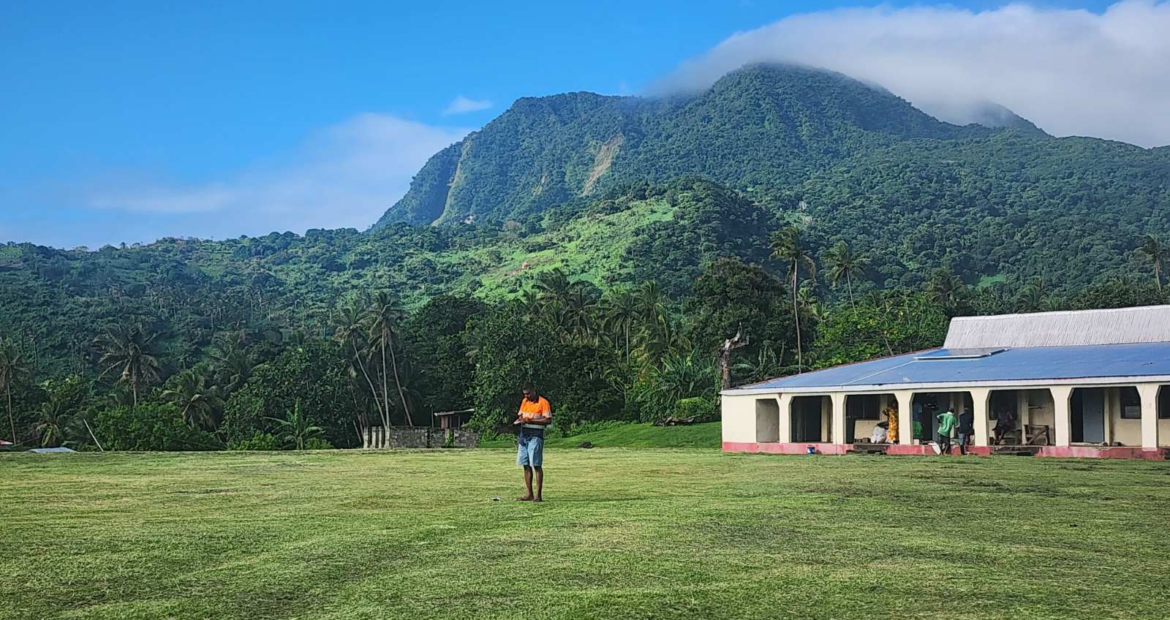Kadavu, Fiji – Bringing clean, reliable, and affordable power to Fiji’s rural and maritime communities is more than just installing solar panels. It’s about building a sustainable future rooted in respect for the land and the people who live on it. For the United Nations Development Programme’s (UNDP) Fiji Rural Electrification Fund (FREF) Support Project, that future begins from the ground up – using people centered approaches to design solar mini-grid solutions.
No two communities are the same, even on the same island. Each rural community in Fiji exists in a unique physical and cultural setting with varying soil types, climate conditions, exposure to disasters, and energy needs. What works in one village may not be suitable for another. Therefore, designing solar mini-grid solutions for each community requires detailed technical scoping and socio-economic baselining to ensure that solutions are fit for purpose and island proofed.
That’s why the FREF team—with support from the Australian Government’s Pacific Climate Infrastructure Financing Partnership— conducted a joint mission to Kadavu, following an earlier visit to Lomaiviti last month. The goal remains the same – to better understand both the ground beneath our feet and the communities we serve.
Why Geotechnical Survey Matters?
Geotechnical surveys are about more than drilling boreholes but about ensuring that the development is safe, sustainable, and in harmony with nature and community needs. Since Stage 1, FREF has carried out detailed geotechnical assessments at over 75 sites across Fiji. These surveys begin with engineers drilling boreholes to extract soil samples at various depths.

Each soil sample is carefully labelled and sent for lab testing, where engineers examine characteristics such as load-bearing capacity, slope stability, and potential settlement under stress. These factors are critical in designing solar mini-grid systems resilient to Fiji’s climate-related risks, such as heavy rainfall, cyclones, and flooding.
The Social Landscape Matters Too
Equally important as the physical ground is the social and economic fabric of each community. FREF is also conducting comprehensive socio-economic baselining throughout the sites to better understand each community’s unique energy needs, aspirations, and capacity to engage with and sustain energy infrastructure.
Community engagement goes beyond simply counting households. It focuses on identifying key local businesses, agricultural activities, and the economic potential that could be unlocked with reliable electricity.

In Nasau, a remote village on Kadavu Island, small business owner Mere Vonu begins her day before sunrise. “Sometimes I open from morning until the kids go to school at 8 a.m. After that, I go to the farm. I do farm too. That’s how I make a living,” she said.
“If we had the solar (grids) here, maybe I’ll have a fridge (to expand businesses)” she added, envisioning how reliable electricity could help grow her livelihood.”
About 20 minutes of drive, in Nabukelevu-i-ra village, Tomasi and Maca Naivalurua run a registered family business from their home. Since opening their canteen in 2024, they have steadily diversified their income through weaving, carpentry, and farming. As their business grew, solar power became a game-changer.
“The solar mainly powers our cold storage, and the generator is mostly for carpentry tools,” Maca explained.
Frozen goods, which depend on steady refrigeration, now make up over 30% of their monthly income. While boat delays still sometimes interrupt supply, their solar-powered setup has added much-needed resilience to their operations.

Whether it’s the weight of a solar panel or the hopes of a community, every energy solution must rest on strong, respectful foundations. By integrating technical insights, local knowledge, and community participation, FREF ensures rural electrification is not only technically sound, but also culturally grounded and community-owned.
The UNDP Fiji Rural Electrification Fund Support Project is made possible through the generous support of the Governments of Australia, Fiji, New Zealand, and the United Kingdom.

